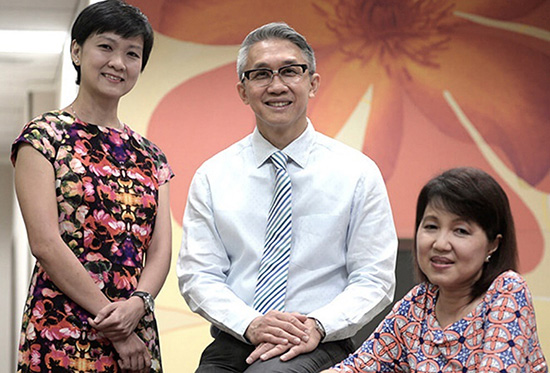Understanding Psoriasis
Psoriasis is a chronic, inflammatory skin condition that affects over 40,000 people in
Singapore. So, if you think you may have psoriasis, you are not alone – comprehensive medical and
social support are available.
People with psoriasis produce new skin cells 4 to 10 times faster compared to normal people. This results in excessive thick scaly inflamed skin we see in psoriasis.
Psoriasis is an immune-mediated inflammatory skin disorder. The underlying immune dysfunction is thought to result from the complex interplay between genetic and environmental factors.
Read on to find out more about:
- What signs and symptoms should one look out for?
- What could trigger or worsen psoriasis?
- What’s the relationship between psoriasis and other diseases?

- Red or silvery patches of thick and scaly skin that are constantly flaking off
- Commonly found on the scalp, elbows, knees and lower back (although other parts of the body are also possible)
- Irritation and itching on the affected areas
- Nails that are thickened, pitted or separated from the nail bed
- Stiff, swollen, painful and/or disfigured joints (in severe cases)

Common factors include:
- Stress and anxiety
- Cold and dry weather
- A skin injury / skin trauma
- Certain medications
- Smoking and heavy drinking
It is important for people with psoriasis to know what triggers a flare-up, because this can vary from
person to person and avoiding triggers can help to reduce the frequency and intensity of
flare-ups.
Having a family history of psoriasis also places one at an increased risk of developing
psoriasis.
One of the most concerning things about psoriasis is its association with a range of other health issues,
most commonly: psoriatic arthritis, metabolic syndrome (e.g. diabetes, obesity, high
cholesterol, insulin resistance), and cardiovascular disease (e.g. stroke, high blood
pressure).
It has been well-documented that people with psoriasis are much more likely to develop the conditions
mentioned above: for instance, in Singapore, the prevalence of metabolic syndrome in people with psoriasis
is 45.1%, which is almost three times more than that of the general population.
As a result, it is imperative that patients commit more time and resources into monitoring and managing
their health in the long run.

Joining Dr Cheong Wai Kwong are Dr Phay Ken-Lin and Dr Neoh Ching Yin, all of whom are particularly experienced in treating psoriasis, on top of all other medical and cosmetic dermatological conditions.

Main Line: (65) 6734 1411
Fax: (65) 6235 5900
Email: enquiry@specialistskin.com.sg
Mon - Fri: 8:30am - 5:00pm
Sat: 8:00am - 1:00pm
Closed on Sundays